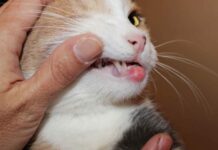Dealing with fleas is a common problem faced by cat owners. When it comes to flea treatment for nursing cats, it becomes even more challenging, as finding safe and effective methods for both the mother and her kittens is crucial. In this article, we will answer the following questions:
- How do you get rid of fleas on a nursing female cat?
- How do I get rid of fleas on my nursing kitten?
- Can nursing cats have advantage flea treatment?
- Can nursing cats have flea and tick medicine?
Treating Fleas in Nursing Mother Cats
Safe Medication Options for Nursing Mothers
When it comes to flea treatment for nursing cats, it is essential to choose safe medication options. Some flea medications may be too strong for a nursing mother and could harm her or her kittens. Therefore, it is essential to consult with a veterinarian before administering any treatments. They will recommend safe, effective medications specifically designed for nursing cats.
Topical Medication for Nursing Mothers
Topical medications are often recommended for flea treatment for nursing cats. These medications are applied directly to the skin, usually between the shoulder blades, and are absorbed into the cat’s bloodstream. This method ensures that the medication is distributed throughout the cat’s body, providing effective flea control. It is essential to choose topical medications specifically designed for nursing mothers to ensure their safety.
Treating Fleas in Kittens
Flea Infestations in Young Kittens
Flea infestations pose severe risks to young kittens, as they can lead to anemia, skin infections, and even death in severe cases. Therefore, it is crucial to address flea problems as early as possible.
Safe Flea Treatment Options for Kittens
To provide effective flea treatment for nursing cats and their kittens, it is vital to choose safe methods that will not harm their delicate bodies. One such method is manual removal, which involves using a fine-toothed flea comb to remove adult fleas and their eggs from the kitten’s fur. This process should be done gently and carefully to avoid causing any harm to the kittens.
Bathing Kittens to Remove Fleas
Another safe method of flea treatment for nursing cats and their kittens is bathing. Using a mild dish soap and warm water, you can carefully bathe the kittens to remove fleas and their eggs from their fur. It is essential to keep the kittens warm and dry them thoroughly after bathing to prevent hypothermia.
Environmental Flea Treatment
Eliminating Fleas from the Living Area
To prevent re-infestation, it is crucial to treat the environment where your nursing cat and her kittens reside. Washing bedding and vacuuming the living area regularly can help eliminate flea eggs and larvae from the environment. In more severe cases, you may need to hire professional exterminators to ensure all fleas are eradicated from your home.
Preventative Measures and Flea Treatments
Flea Collars, Oral Medication, and Herbal Treatments for Older Kittens
As your kittens grow older, you can consider using flea collars, oral medication, and herbal treatments as part of their ongoing flea treatment for nursing cats and their offspring. Flea collars can provide long-lasting protection, while oral medications can be administered once the kittens are old enough, as recommended by your veterinarian. Herbal treatments, such as those containing natural oils and extracts, may also be considered for their flea-repellent properties.
Can Nursing Cats Have Advantage Flea Treatment and Flea and Tick Medicine?
When it comes to flea treatment for nursing cats, you may wonder whether nursing cats can have Advantage flea treatment or other flea and tick medications. While some flea treatments may be safe for use on nursing cats, it is crucial to consult with your veterinarian before administering any medications. They will determine the most appropriate flea treatment based on the specific needs of your nursing cat and her kittens, ensuring their safety and wellbeing.
The Importance of Consulting with a Veterinarian
As emphasized throughout this article, consulting with a veterinarian is essential when choosing the most suitable flea treatment for nursing cats and their kittens. Your veterinarian will consider factors such as the age, size, and overall health of your cat and her kittens, as well as any potential risks associated with the medications. This professional guidance will help you make informed decisions and ensure the safety and health of your beloved pets.
Conclusion
In conclusion, providing effective flea treatment for nursing cats and their kittens is crucial for their health and wellbeing. By considering safe medication options, manual removal, bathing, and environmental treatments, you can help protect your nursing cat and her kittens from flea infestations. Preventative measures, such as flea collars, oral medications, and herbal treatments, can also play a vital role in maintaining their ongoing health. Remember to consult with your veterinarian before administering any treatments to ensure the best course of action for your nursing cat and her kittens.

